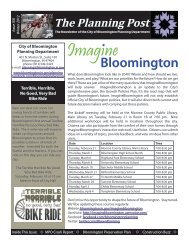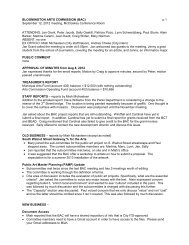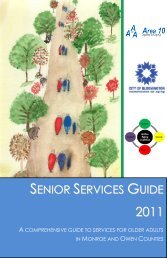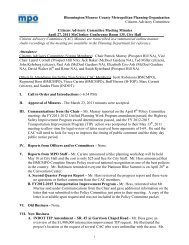Peak Oil Task Force Report - City of Bloomington - State of Indiana
Peak Oil Task Force Report - City of Bloomington - State of Indiana
Peak Oil Task Force Report - City of Bloomington - State of Indiana
You also want an ePaper? Increase the reach of your titles
YUMPU automatically turns print PDFs into web optimized ePapers that Google loves.
4. <strong>Peak</strong> oil will likely present additional fire safety concerns.<br />
It is likely that as oil becomes more and more expensive, some residents might try to hoard<br />
gasoline – a practice that presents serious safety risks. It is also expected that, as electricity<br />
and gas become more expensive, more residents will turn to heating their homes with<br />
wood and biomass. Gasoline hoarding and heating with biomass will call for more fire<br />
suppression and will require the Fire Department to engage in even more fire‐safety<br />
community awareness efforts.<br />
MITIGATION GOALS & STRATEGIES<br />
SHORTTERM (15 years)<br />
1. Priority should be granted to Police and Fire in adding new staff to the <strong>City</strong>.<br />
2. The <strong>City</strong> should develop a fuel allocation plan wherein, in the event <strong>of</strong> a fuel<br />
shortage, the Police and Fire Departments are given greatest priority.<br />
3. The <strong>City</strong> should plan for shortages and supply disruptions and transition<br />
backup generators away from diesel fuel.<br />
4. Anticipating a period <strong>of</strong> growing social problems, the Police Department<br />
should work with Neighborhood Associations to develop neighborhood<br />
patrols.<br />
5. The Police Department should continue to invest in bicycles, neighborhood<br />
electric vehicles, etc. and should consider the use <strong>of</strong> horse patrols where<br />
appropriate.<br />
6. Anticipating more fuel hoarding and nonconventional home heating<br />
practices, the Fire Department should provide community outreach on the<br />
dangers <strong>of</strong> hoarding and how to practice safe home heating using biomass.<br />
7. The Fire Department should investigate to what extent the fire trucks could be<br />
retr<strong>of</strong>itted to run on B100. B100 holds the possibility <strong>of</strong> fueling fire trucks by<br />
use <strong>of</strong> locallyderived lipids such as restaurant grease. 104<br />
104 The National Biodiesel Board advises that “high percent blends can impact fuel system components<br />
(primarily fuel hoses and fuel pump seals) that contain compounds incompatible with B100. Manufacturers<br />
recommend that natural or butyl rubbers not be allowed to come in contact with pure biodiesel or biodiesel<br />
blends higher than B20. Over the past 15 years <strong>of</strong> use, blends <strong>of</strong> B20 or lower have not exhibited problematic<br />
<strong>Report</strong> <strong>of</strong> the <strong>Bloomington</strong> <strong>Peak</strong> <strong>Oil</strong> <strong>Task</strong> <strong>Force</strong><br />
67









